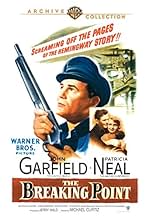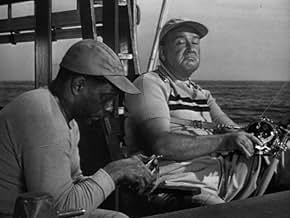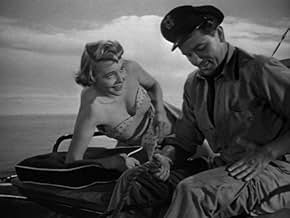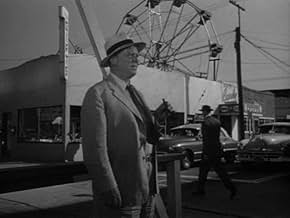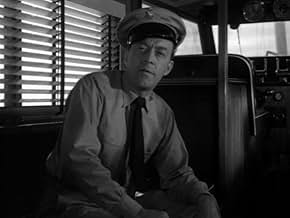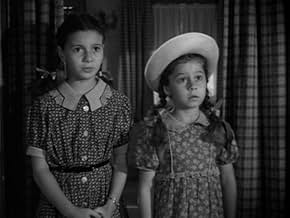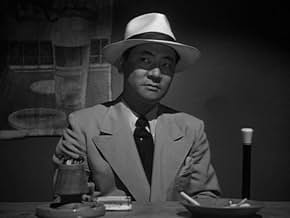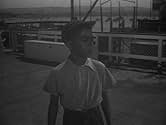NOTE IMDb
7,5/10
4,9 k
MA NOTE
Ajouter une intrigue dans votre langueAn otherwise moral captain of a charter boat becomes financially strapped and is drawn into illegal activities in order to keep up payments on his boat.An otherwise moral captain of a charter boat becomes financially strapped and is drawn into illegal activities in order to keep up payments on his boat.An otherwise moral captain of a charter boat becomes financially strapped and is drawn into illegal activities in order to keep up payments on his boat.
- Réalisation
- Scénario
- Casting principal
- Récompenses
- 4 victoires au total
John Alvin
- Reporter
- (non crédité)
Chet Brandenburg
- Taxi Driver
- (non crédité)
Peter Brocco
- Macho
- (non crédité)
Mary Carroll
- Girl at Bar
- (non crédité)
Spencer Chan
- 1st Chinese Immigrant
- (non crédité)
John Close
- Deputy
- (non crédité)
Avis à la une
No one played the haunted/hunted character better than John Garfield (Humphrey Bogart is a close second). Here, Garfield is a boat captain that gets in way over his head. The thing with Garfield's characters, is that even though the audience sympathizes with his plight, the character always brings it on himself. With Garfield's usual acerbic delivery, his Harry Morgan is hard to like but when he is with his family, one sees that he is basically a headstrong but good guy. Even though Michael Curtiz directed this, the tone and especially the ending shot kept reminding me of Fritz Lang. I think this film should be commended for the ending, which although a somewhat happy one, reminds the audience of the affect of one's actions on everyone. This generally was ignored in a lot of the crime dramas from the 30's to the 60's. My only complaint is the Patricia Neal character seemed tacked on for romance sake. She didn't add much and certainly didn't have an impact on the main thrust of the story. But that is a minor quibble. Another gem for one of the move overlooked actors - John Garfield.
I just saw this movie in the last week at a recent Film Noir Festival here in San Francisco. Garfield owns this role as a down on his luck captain of his boat. He is willing to take shady deals to make money for him and keep his family (his two young daughters) with money. His wife played by Phyllis Thaxter gives a fine turn as a wife and mother. Patricia Neal is smooth and dangerous in her role as a two timing blonde broad. The daughters that played the kids were effective and smart like their ages were depicted. Garfield's mate Wesley Park was very good in his role of Garfiled's suffering partner. The reptilian role of the attorney was convincing and nasty. The final minutes of the movie had me choked up with the performances from Garfield and Thaxter. Another great movie by Michael Curtiz. Why isn't this movie on DVD?
... He is the same guy as always, struggling against odds, railing about making it, etc., but toned down a bit. He takes umbrage but there is a restraint that is not present in his earlier more angry-young-man roles. Maybe because he looks as little filled out and older and is a family man to boot. There is a relative maturity in the character that is appealing. Despite playing the proverbial "same role" as some actors are thought of as doing, there is no sense that he is phoning it in. And he holds up more effective than ever with the ultimate no-nonsense imperative of tough guys. Tough but regular too, I like the opening sally, i.e., to the effect that when out to sea a certain tranquillity can reign but back on land nothing but trouble. I like that, especially with the ultimate irony to come.
The domestic scenes are not Hemingway, but added for the movie. A wonderful decision. It rounds out Garfield's character giving him a softer side and allows for the domestic sweetness and wholesome prettiness of Phyllis Thaxter to be his wife. I like to feel that her all-to-obvious new hairdo was not lost on her husband and that it might have helped him decide on another matter regarding a certain lady.
Garfield's remark to his 10-year-old daughter about being "too old to run around (the house) like that" (i.e., in night clothes) was a surprising but effective slice-of-life detail that perhaps only in a small way ushers in the new 50s sensibility regarding such matters that will make films more frank and real with youth (teens) issues.
Patricia Neal is stunning as the would-be femme fatale, - would-be because she falls short of treachery. Her worldly manner and sophisticated beauty provides a stark contrast to Garfield's women in the story. She wants to seduce, and pending the outcome, have the goods on him for revenge. Is she too sympathetic for this? Up in the air,,pending definitions. Reliable veteran character actor Wallace Ford has a good gig as a low-level conduit to the underworld. He has good dialogue, pushy and sarcastic with his own clients but totally subservient when around the big boys. A happy addition to the story. The poor boy alone on the pier resonates and is discomforting.
The domestic scenes are not Hemingway, but added for the movie. A wonderful decision. It rounds out Garfield's character giving him a softer side and allows for the domestic sweetness and wholesome prettiness of Phyllis Thaxter to be his wife. I like to feel that her all-to-obvious new hairdo was not lost on her husband and that it might have helped him decide on another matter regarding a certain lady.
Garfield's remark to his 10-year-old daughter about being "too old to run around (the house) like that" (i.e., in night clothes) was a surprising but effective slice-of-life detail that perhaps only in a small way ushers in the new 50s sensibility regarding such matters that will make films more frank and real with youth (teens) issues.
Patricia Neal is stunning as the would-be femme fatale, - would-be because she falls short of treachery. Her worldly manner and sophisticated beauty provides a stark contrast to Garfield's women in the story. She wants to seduce, and pending the outcome, have the goods on him for revenge. Is she too sympathetic for this? Up in the air,,pending definitions. Reliable veteran character actor Wallace Ford has a good gig as a low-level conduit to the underworld. He has good dialogue, pushy and sarcastic with his own clients but totally subservient when around the big boys. A happy addition to the story. The poor boy alone on the pier resonates and is discomforting.
An underrated flick in the Garfield canon. His charter boat captain, Morgan, may not be very likable, but the actor makes him a compelling tough guy. So, how's Morgan going to pay his debts and keep his charter boat. It's a struggle, especially when wheedling deal-maker Duncan (Ford) keeps tempting him with illegal transporting. It's really a battle for Morgan's soul though he doesn't realize it. On one hand there's faithful wife Lucy (Thaxter) and two small daughters, along with deck hand Park (Hernandez) depending on him for support. On the other, is smoothy Duncan, sultry temptress Leona (Neal), and an array of criminal types offering him money for illegal services. Trouble is Morgan loves both Lucy and his boat, so will he stay honest and get a new livelihood, or will he succumb to seductive overtures from Duncan and turn criminal boat captain.
Garfield's Morgan is not a nice guy, so the outcome is uncertain. Every other word is a smart-alecky remark, and though he loves wife Lucy and the two little girls, he seems to forget them when obsessing about his boat. Clearly, his ego is tied up with being a captain.
It's a perfect Garfield role, and he gives no quarter. At the same time, Thaxter works wonders as the sympathetic wife without getting smarmy, a really difficult role. And shouldn't overlook Neal whose grinning blonde temptress resembles a figure from perhaps the lower regions. Then too, inclusion of Black actor Hernandez was a bold one for 1950 when Black actors were still mostly servants or comic relief. Moreover, his inclusion results indirectly in one of the most brilliantly poignant final scenes in film annals. I get the feeling the writers were doing their best to avoid a typical Hollywood ending, which was still the norm.
All in all, the movie deserves a ranking just below Garfield's celebrated Force of Evil (1948) as a study in self-realization. Please, TCM, revive the flick whenever you can.
Garfield's Morgan is not a nice guy, so the outcome is uncertain. Every other word is a smart-alecky remark, and though he loves wife Lucy and the two little girls, he seems to forget them when obsessing about his boat. Clearly, his ego is tied up with being a captain.
It's a perfect Garfield role, and he gives no quarter. At the same time, Thaxter works wonders as the sympathetic wife without getting smarmy, a really difficult role. And shouldn't overlook Neal whose grinning blonde temptress resembles a figure from perhaps the lower regions. Then too, inclusion of Black actor Hernandez was a bold one for 1950 when Black actors were still mostly servants or comic relief. Moreover, his inclusion results indirectly in one of the most brilliantly poignant final scenes in film annals. I get the feeling the writers were doing their best to avoid a typical Hollywood ending, which was still the norm.
All in all, the movie deserves a ranking just below Garfield's celebrated Force of Evil (1948) as a study in self-realization. Please, TCM, revive the flick whenever you can.
With the Depression, the so-called "upper class," the subject of so many plays and films, began to fade and be replaced by the work of playwrights such as Clifford Odets.
John Garfield was the type of leading man who came out of that kind of working man play -- more rugged than romantic, more blue collar than white collar, more at home in a leather jacket than a tuxedo. That leading man type would peak post-war with the likes of Dean, Brando, Steiger, Newman, McQueen, and others. But their predecessor was John Garfield.
Here he stars in his second-last film, as he would soon be blacklisted -- it's "The Breaking Point," based on the Hemingway novel "To Have and Have Not," but not really like the Bogart-Bacall film, which borrowed the title.
In "The Breaking Point," Garfield plays Harry Morgan, who runs a charter boat in California. He has a wife, Lucy (Phyllis Thaxter) and two daughters (Sherry Jackson, Donna Jo Boyce). Times are tough (the original novel took place during the Depression) and Harry is having trouble making enough money to pay off his boat and raise his family.
Lucy wishes her husband would work for his father on his lettuce farm in Salinas, but Harry says all he knows is boats.
Because he needs money, Harry agrees to carry out a shady deal, transporting Chinese to the United States. But when he is cheated out of most of his money, he returns the men where he picked them up. However, someone rats on him and he nearly loses his boat.
When the boat's owner threatens to take the boat for nonpayment, Harry agrees to another shady deal; this one proves more dangerous.
Very intense film which also stars Juano Hernandez, who was wonderful in so many films until his death in 1970; Patricia Neal in her "babe" days, as a former boat passenger who is attracted to Harry; and Wallace Ford, as a foolish man involved in nefarious schemes. William Campbell, whose big claim to fame was that he was married to JFK's girlfriend Judith Exton, plays a low-level criminal.
John Garfield gives a brilliant performance as a stubborn, intense, desperate man who doesn't know where to turn. His last movie, He Ran All the Way, was a B movie and a clear indication that, thanks to the Communist witch hunt, he was on his way out. He died two years later.
Beautifully directed by Michael Curtiz, the end of the movie is especially poignant.
John Garfield was the type of leading man who came out of that kind of working man play -- more rugged than romantic, more blue collar than white collar, more at home in a leather jacket than a tuxedo. That leading man type would peak post-war with the likes of Dean, Brando, Steiger, Newman, McQueen, and others. But their predecessor was John Garfield.
Here he stars in his second-last film, as he would soon be blacklisted -- it's "The Breaking Point," based on the Hemingway novel "To Have and Have Not," but not really like the Bogart-Bacall film, which borrowed the title.
In "The Breaking Point," Garfield plays Harry Morgan, who runs a charter boat in California. He has a wife, Lucy (Phyllis Thaxter) and two daughters (Sherry Jackson, Donna Jo Boyce). Times are tough (the original novel took place during the Depression) and Harry is having trouble making enough money to pay off his boat and raise his family.
Lucy wishes her husband would work for his father on his lettuce farm in Salinas, but Harry says all he knows is boats.
Because he needs money, Harry agrees to carry out a shady deal, transporting Chinese to the United States. But when he is cheated out of most of his money, he returns the men where he picked them up. However, someone rats on him and he nearly loses his boat.
When the boat's owner threatens to take the boat for nonpayment, Harry agrees to another shady deal; this one proves more dangerous.
Very intense film which also stars Juano Hernandez, who was wonderful in so many films until his death in 1970; Patricia Neal in her "babe" days, as a former boat passenger who is attracted to Harry; and Wallace Ford, as a foolish man involved in nefarious schemes. William Campbell, whose big claim to fame was that he was married to JFK's girlfriend Judith Exton, plays a low-level criminal.
John Garfield gives a brilliant performance as a stubborn, intense, desperate man who doesn't know where to turn. His last movie, He Ran All the Way, was a B movie and a clear indication that, thanks to the Communist witch hunt, he was on his way out. He died two years later.
Beautifully directed by Michael Curtiz, the end of the movie is especially poignant.
Le saviez-vous
- AnecdotesAccording to TCM's Eddie Muller, John Garfield thought this was his best performance and that it was the film of which he was most proud.
- GaffesWhen she first steps onto the boat, Patricia Neal's voice is heard saying "we're off to sunny Mexico," but her lips aren't moving.
- Citations
Harry Morgan: You know, my wife dyed her hair.
Leona Charles: Coincidentally I've been thinking of letting mine grow out. Speaking of coincidences, I live in Number Seven. My friends just kick the door open.
- Crédits fousTHE END close out. All lettering aligned and centered except for the line beneath Warner Bros. that begins PICTURES. It's left registered with whatever wording that followed it 'air brushed' over using the lower right drop shadow pattern leaving a Warner Bros. Pictures _?_?_?_?_ mystery.
- ConnexionsFeatured in The John Garfield Story (2003)
- Bandes originalesPlease Don't Talk About Me When I'm Gone
(uncredited)
Music by Sam H. Stept
Lyrics by Sidney Clare
Sung by Patricia Neal in the bar
Meilleurs choix
Connectez-vous pour évaluer et suivre la liste de favoris afin de recevoir des recommandations personnalisées
- How long is The Breaking Point?Alimenté par Alexa
Détails
- Durée1 heure 37 minutes
- Couleur
- Rapport de forme
- 1.33 : 1
Contribuer à cette page
Suggérer une modification ou ajouter du contenu manquant

Lacune principale
By what name was Trafic en haute mer (1950) officially released in India in English?
Répondre


